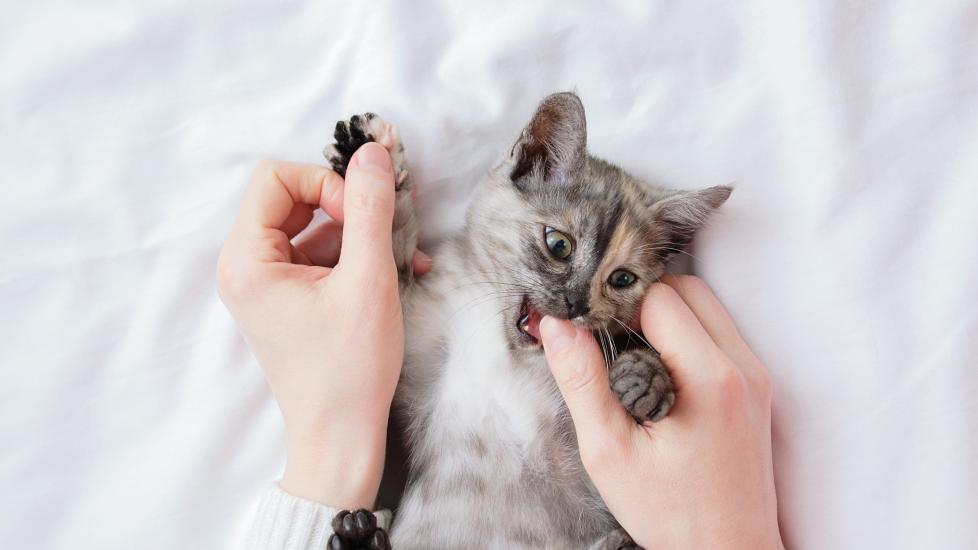 Cat Love Bites: Understanding the Purr-fectly Playful Gesture
Cat Love Bites: Understanding the Purr-fectly Playful Gesture
Introduction:
In the feline world, cats communicate through a variety of signals—from meows to tail swishes. One such signal that often puzzles cat owners is the love bite or play bite. These seemingly aggressive nips can leave pet parents scratching their heads and questioning whether they are signs of affection or aggression. This article aims to unravel the mystery behind cat love bites, exploring why these behaviors occur and how you can respond in ways that maintain harmony between you and your purring companion.
Understanding Feline Communication:
Cats have an intricate language that allows them to express themselves effectively. While human communication relies heavily on verbal cues, cats use body language, vocalizations, and even scent marking to convey messages. Love bites fall into this complex system as a form of social interaction within both domestic and wild cat communities.
Reasons for Love Bites:
1. Play Behavior: The most common explanation for love bites is playful intent. Cats engage in rough-and-tumble play from a young age, which helps develop hunting skills and strengthens relationships with littermates. As pets, these instincts remain, so when your cat plays with you, it may occasionally nip too hard without intending harm.
2. Affectionate Greeting: Some cats give love bites as part of their greeting ritual, especially if they’re excited to see you. It could be a way to mark you with their scent, showing ownership and claiming you as part of their territory.
3. Overstimulation: Just like humans, cats can experience overstimulation during petting sessions. If you continue to stroke areas they find particularly sensitive (like under the chin or around the ears) after they’ve had enough, they might gently bite you to indicate that it’s time to stop.
4. Curiosity Gone Awry: Curious kittens sometimes take things a bit too far by biting out of sheer fascination. As they grow and learn more about appropriate behavior, these incidents usually decrease.
5. Defensive Response: In rare cases, love bites can signify fear or anxiety. If a cat feels threatened, it may resort to biting as a means of self-defense. However, this should not be confused with true aggression, which typically involves hissing, growling, and raised fur.
Responding Appropriately:
1. Recognize Signals: Pay close attention to your cat’s body language before, during, and after a love bite. A playful nip will likely come with relaxed eyes, wagging tails, and perhaps a chirrup or trill. Aggressive behavior looks very different; it includes flattened ears, crouching posture, and hissing sounds.
2. Set Boundaries: If your cat seems to bite harder than necessary during playtime, establish clear boundaries by saying “Ouch!” in a firm but non-alarming voice. This lets your cat know that the behavior isn’t acceptable without escalating the situation.
3. Positive Reinforcement: Reward calm behavior with treats and praise. Positive reinforcement encourages good manners while discouraging overly enthusiastic displays.
4. Consistent Routine: Provide plenty of mental and physical stimulation to keep your cat happy and well-exercised. Regular playtimes help reduce boredom, which can lead to excessive biting.
5. Environmental Enrichment: Create an environment that meets your cat’s needs. Scratching posts, perches, toys, and hiding spots all contribute to reducing stress and promoting good behavior.
6. Health Check: Occasionally, persistent biting could indicate underlying health issues. Regular check-ups with the veterinarian ensure early detection and treatment of any medical problems.
Conclusion:
Love bites are a fascinating aspect of our feline friends’ behavior, reflecting the complexity of their emotions and interactions. By understanding why these occurrences happen and responding appropriately, we strengthen our bond with our pets, creating a harmonious home where everyone feels safe and loved. Remember, each cat has its own personality and preferences, so patience, consistency, and individualized care go a long way in building trust and mutual respect.
